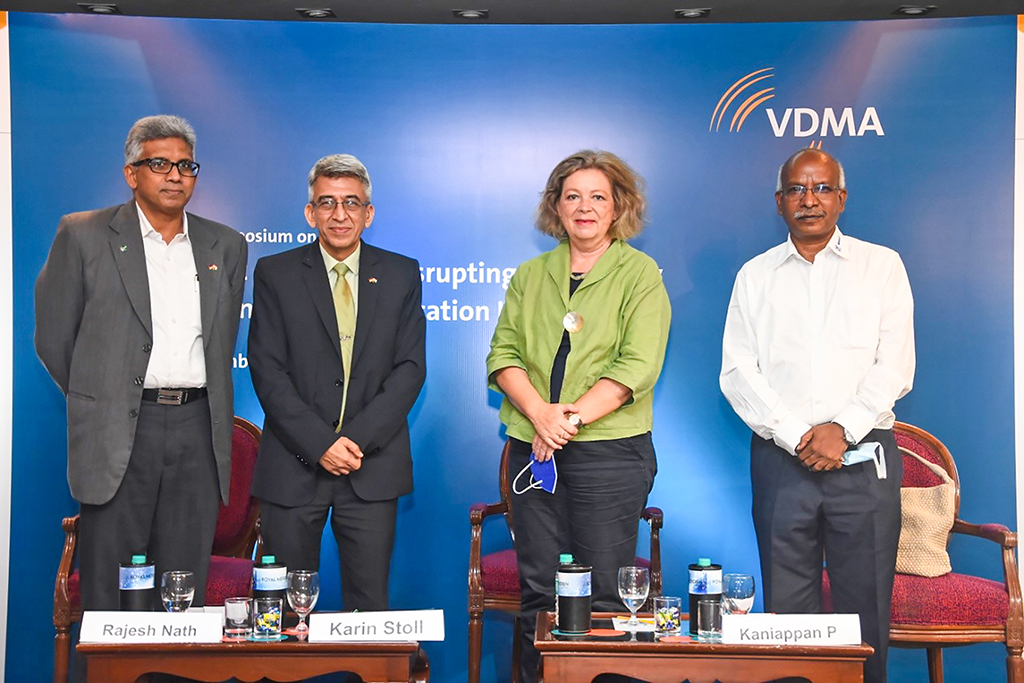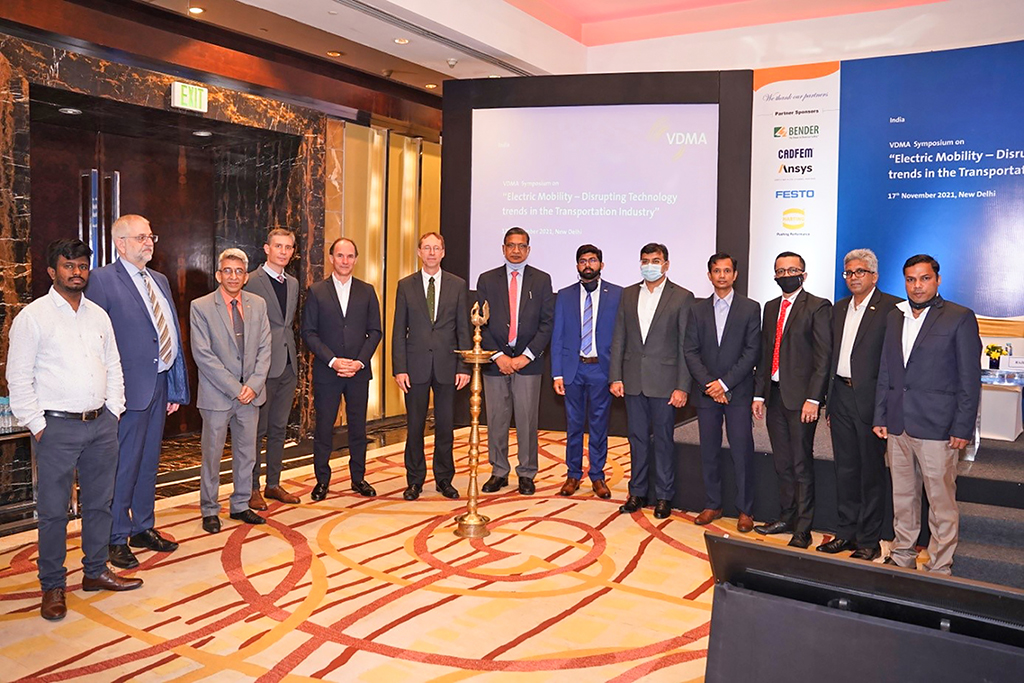
The symposia, held in Delhi and Chennai, focused on the many technological aspects related to manufacturing EVs
The Indian automotive industry is the fifth-largest in the world and is slated to be the third-largest by 2030. Catering to this vast domestic market, reliance on the conventional modes of fuel intensive mobility will not be sustainable. Hence, by making the shift towards electric vehicles (EVs), India stands to benefit on many fronts. India has been astute about the increased utility of electric vehicles and the Faster Adoption and Manufacturing of Hybrid and Electric Vehicles (FAME) I and II schemes are aimed at promoting the adoption of electric vehicles and creating a robust EV charging infrastructure.

In the light of this burgeoning potential, VDMA has been creating comprehensive awareness on the emerging technology trends in electric mobility and its manufacturing competitiveness. VDMA India together with esteemed partners Bender, Cadfem, Festo, Harting, Infineon, Schaeffler, Weiss and Zwick Roell conducted a symposium titled ‘Electric Mobility – Disrupting Technology Trends in the Transportation Industry’ at Radisson Blu Plaza Delhi Airport in Delhi on November 17, 2021 and Le Royal Meridien in Chennai, on November 19, 2021, respectively.
At Delhi, the event organised by VDMA India started off with the traditional lamp-lighting ceremony by the chief guest Dr. Steffen Koch, Head of Department for Economics and Global Affairs, Embassy of the Federal Republic of Germany and Guest of Honour B B Gupta, President Strategy and Business Planning, JBM Group, Delhi. In Chennai on November 19, 2021, the event commenced with the lighting of the lamp by Chief Guest Ms. Karin Stoll, Consul General, German Consulate, Chennai and Kaniappan P, Managing Director, WABCO India who was the Guest of Honour.
The welcome address at both the locations of Delhi and Chennai was given by Rajesh Nath, Managing Director, VDMA India, who highlighted the importance of the EV industry in the coming future and also gave a brief update on related policies drafted by the central and some of the state governments as incentives programmes for EV. He gave an update on PLI and other schemes by various governments for the betterment of the EV industry. After that, in Delhi, an update on Indo-German trade was shared by Dr. Steffen Koch. B B Gupta presented details regarding the accelerated growth of the electric mobility technological ecosystem in India.
In Chennai, Ms. Karin Stoll shared information about the current vaccination drives in Germany and the rising number of cases of the new variant of the virus. Kaniappan P spoke about the accelerated growth of the electric mobility technological ecosystem in India. The special address set the stage for the other speakers and the participants to understand the present situation in the subcontinent regarding e-mobility growth. The presentations from the partners covered on and off-vehicle solutions like plant automation in Germany. At both the symposia, the presentations were divided into pre and post-lunch technical discussions.
In these technical presentations, Bender made a presentation on the topic of electrical safety solution for e-mobility which was anchored by Washim Ahamed, Senior Manager-Sales and Marketing in Delhi. It covered the vast portfolio in battery management system and charging infrastructure and the same presentation was given by Raghavendra Sajjan, Senior Manager–Sales and Marketing, Bender, in Chennai. There was a presentation from Cadfem on simulation and analysis in EVs which can reduce 50% of testing and modelling time in production and research and development cycles. The presentation on computational modelling to step up e-mobility to realise efficient, reliable powertrains was presented by technology specialist Santhosh Manepally at both the locations and it helped the audience to understand the uses and current upgrades in simulation software in the EV segment.
The presentation of Vijay Menon, Senior Business Development Manager, Festo, included the subject of automation in the manufacturing of EVs with a focus on opportunities for new manufacturing automation benchmarks. He spoke about the current and upcoming trends in automation, comparing India to the current global standards. He stated that the new technology in automation has to be integrated for achieving the most effective process on the shop floor.
Solutions from Harting were presented by Shashank Narayan, Market Manager–E-Mobility, who shared details about the charging infrastructure ecosystem for growing electric mobility.
Connectivity solution remains one of the main drawbacks in India for a faster phase in the EV sector. According to Narayan, only when consumers will see an extensive network of public charging stations will they consider EVs a feasible mobility solution. Thus, a reliable and accessible network of public chargers is imminent. A presentation on trends and developments in e-mobility was made by Narendra Walvekar, Senior Manager-Automotive Sales of Infineon in Delhi and by Srinivasan Parthasarathy, Senior Manager-Automotive Sales of Infineon in Chennai.

This gave the participants an opportunity to understand the semiconductor and electronics side of the EV game with details about the microprocessor and the power electronics which goes into the vehicle. The talk also focused on upcoming technology regarding cooling and how silicon carbide enables better power semiconductors and improved battery management systems. This was followed by a talk on automation in the electric mobility ecosystem by Franz Oebels, Director-Global Sales and Key Accounts, Market Segments and Technology, Weiss Automation, who explained the subsystem for body parts’ assembly and predictive maintenance application. He also shared details about assembly line applications for battery packs and motor drives.
The presentation on mechanical testing solutions for e-mobility was made by Zwich Roell’s Ashim Jyoti Sharma, Associate General Manager in Delhi and by Girish Sharma, Automotive Industry Specialist in Chennai. They introduced to the participants testing solutions for e-mobility applications and explained the importance of testing in lithium ion battery, fuel cells and different equipments that go into the making of EVs. A presentation on electrification outlook in the automotive industry was given by Sanjeev Saxena, President–Automotive, Schaeffler at the Delhi symposium.
He explained the importance of hybrid and electric drivetrains and the future products that would be developed for a better transmission system in the upcoming models of EVs. He also explained the concept of carbon neutrality and the method and process of achieving carbon neutrality. Saxena said that the IC engine and the EV market are going to have their own market spaces and he further explained that the IC or combustion engine market would not be significantly affected by EVs in passenger vehicles in the coming decade. After the daylong presentations, participants representing different segments in the EV ecosystem engaged in a question and answer session which was followed by concluding remarks by Rajesh Nath, Managing Director, VDMA in Delhi and S Manohar, Regional Head South, VDMA India at the Chennai symposium.